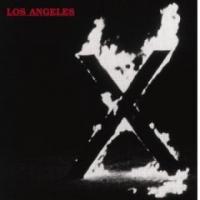The early L.A. punk scene had a rich and diverse array of bands that included the Germs, the Bags, the Weirdos, the Screamers, and the Go-Go's. One of the most talented and accessible from that group was X. They drew from `50s and `60s rock while like their fellow West coast bands, crafted a sound that was theirs and theirs alone. In 1980, they released their debut Los Angeles, a sprawling, moody punk rockân'roll barrage that resonated as loud and clear back then as it does today.
"Los Angeles" upon closer look seems like a clash of contrasting elements but ultimately ones the band makes work for them. From the opening riffs in "Johnny Hit and Run Paulene," the record charges through at a frenzied pace courtesy of veteran guitarist Billy Zoom's amped up, rockabilly flair. But it also maintains direction and control via the tight drumming of the aptly named D.J. Bonebreak. The record is rooted in punk's explosive energy with tracks like "Your Phone's Off the Hook, But You're Not" and the snarling stomp of "Nausea." But with the addition of keyboards from producer Ray Manzarek (ex-Doors), it also paints a warm, visceral landscape that borders on an outright spiritual sensibility. The dreamy textures within "The World's a Mess, It's in My Kiss" are an example of this. Make no mistake though, the core of the record is still melodic rockân'roll in a blender set on high as their hyperactive cover of the Doors' "Soul Kitchen" should attest to.
What is immediately noticeable about X is the dual vocalists, Exene Cervenka and bassist John Doe. Their differing styles make them an unlikely pair. Exene has a wail to go along with a voice as sweet as it haunting while John's more soulful tenor is sturdy and grounded. But with each taking turns at lead vocals, they effectively add a compelling dimension to the songs via their pinpoint harmonizing and distinct vocal interplay. Case in point is the beautiful ballad "The Unheard Music," which is seemingly a reflection on their then flourishing underground punk counterculture. The highlight of the record may be their back-and-forth call in the classic title track "Los Angeles," which is about a girl leaving the city after succumbing to xenophobia.
Lyrically, X's songs had a dark and gritty quality to them, a byproduct of an honest and unfiltered look on sex, love, and life in Los Angeles. Their poetic style naturally has an abstract, stream of consciousness trait to it such as in "Nausea," but also a tangible and graphic one as in the horrific account of a rape in "Johnny Hit and Run Paulene." In the blistering "Sugarlight," when John sings "Sugarlight we're addicts / Why do you think we came / He's pasting gold leaches on my arm / We sharpen up our teeth / White sugar he speaks French / Memorizing torsos he's open throated," it feels like you could be in some dingy room in Skid Row shooting up with him, until a closer look at the song reveals it is actually about gay men living in the city.
On successive records throughout the `80s, X would further expand on the blueprint set here. It's debatable as to whether or not they ever topped this effort. Nevertheless, the collective inputs of accomplished musicians and talented songwriters helped to add another unique face to punk's beginnings. From Billy Zoom's rockabilly footprints and DJ's powerful drumming, to the incomparable Exene / John Doe dynamic and a dash of the Doors spirit, X firmly stood up to and stood out amongst their contemporaries. Los Angeles would be proof of that.
